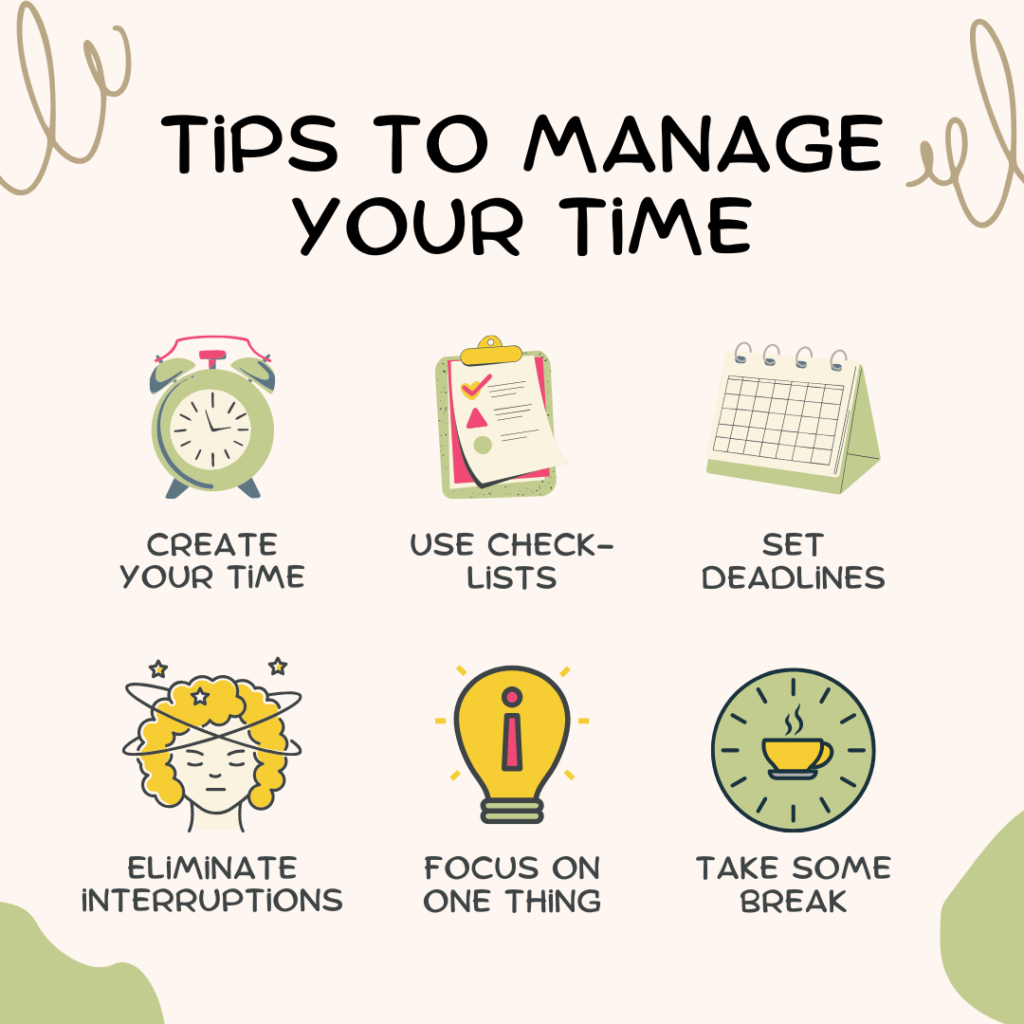Students often struggle with stress, anxiety, lack of focus, and constant distractions. Between assignments, exams,…

Effective Time Management Tips for Students
Time management is a crucial skill for students to master, especially when juggling classes, assignments, extracurricular activities, and personal commitments. Knowing how to effectively manage your time can make a huge difference in your academic success and overall well-being. In this blog, we’ll share practical and easy-to-follow time management tips that will help students stay organized, reduce stress, and maximize their productivity.
1. Set Clear Goals and Priorities
Before you can manage your time effectively, it’s important to know what your goals are. Start by setting both short-term and long-term goals. Short-term goals might include completing an assignment or preparing for a test, while long-term goals could be related to achieving certain grades or gaining skills.

Once you have your goals, prioritize them. Ask yourself which tasks are most urgent and which are most important. Use a system like the Eisenhower Matrix to categorize tasks into:
- Urgent and Important: These tasks need immediate attention (e.g., an assignment due tomorrow).
- Important but Not Urgent: These are tasks that are important but not time-sensitive (e.g., studying for exams that are weeks away).
- Urgent but Not Important: Tasks that demand attention but may not be as significant (e.g., replying to non-urgent emails).
- Not Urgent and Not Important: These can be distractions and are best minimized.
By setting clear goals and priorities, you can focus on what truly matters, ensuring that your time is used efficiently.
2. Create a Daily and Weekly Schedule
A well-planned schedule is the foundation of effective time management. Start by making a weekly schedule that includes all your classes, study sessions, extracurricular activities, and any other regular commitments. Use tools like planners, digital calendars, or time-management apps to stay organized.
For daily planning, create a to-do list either the night before or in the morning. Break your tasks into smaller, manageable chunks, and assign specific time slots for each. This helps you stay focused throughout the day, and ticking off completed tasks gives a sense of accomplishment.
Remember to be realistic about the time you allocate for each task. It’s better to overestimate how long something will take rather than underestimate and end up feeling rushed.
3. Avoid Multitasking
While it may seem like a good idea to multitask to get more done, research shows that it often leads to lower productivity and increased errors. When you switch between tasks, your brain takes time to adjust, which can actually waste time.
Instead, focus on one task at a time. For example, if you’re studying for an exam, turn off notifications on your phone and focus entirely on the material. Once you complete one task, take a short break before moving on to the next. This helps maintain concentration and reduces the risk of burnout.
4. Use Time-Blocking Techniques
Time-blocking is an effective method for managing your day. It involves dividing your day into blocks of time, each dedicated to a specific task or activity. For instance, you might block 9:00–10:00 AM for reading, 10:00–11:00 AM for writing an assignment, and 11:00–11:30 AM for a break.
Time-blocking not only helps you stay focused but also creates a sense of structure. It ensures that you dedicate enough time to each task without feeling overwhelmed. Don’t forget to include breaks between blocks to recharge your mind and avoid fatigue.
5. Eliminate Distractions
Distractions are one of the biggest barriers to effective time management. It’s easy to lose track of time when you’re constantly checking social media or responding to messages. To minimize distractions, create a study environment that is quiet and free from interruptions.
You can also use tools like website blockers to restrict access to distracting sites while you’re working. Additionally, consider setting specific times for checking your phone or social media, so you don’t get distracted during your focused work periods.
6. Break Down Large Tasks
Large tasks, such as writing a research paper or studying for an exam, can feel overwhelming. One of the best strategies is to break these tasks into smaller, more manageable steps. For example, if you have to write a research paper, break it down into steps like:
- Researching the topic
- Creating an outline
- Writing the introduction
- Developing the body paragraphs
- Reviewing and editing
By tackling these smaller tasks one at a time, you make the assignment less daunting and easier to complete within your timeframe.
7. Use the Pomodoro Technique
The Pomodoro Technique is a popular time-management strategy that involves working for a set period (usually 25 minutes) and then taking a short break (5 minutes). After completing four “Pomodoros,” you take a longer break (15–30 minutes). This method helps maintain focus and productivity while preventing burnout.
The Pomodoro Technique is particularly effective for students because it balances work and rest, allowing you to stay motivated and productive over longer periods. You can use timers or apps designed for this technique to make it easier to implement.
8. Learn to Say No
It’s easy for students to become overwhelmed by commitments if they say yes to every opportunity. While it’s important to be active and engaged, it’s equally important to know your limits. If you already have a full schedule, it’s okay to decline additional activities or responsibilities.
Learning to say no when needed will help you focus on your priorities and avoid burnout. It also ensures that you have enough time for rest and self-care, which are essential for maintaining a balanced and productive lifestyle.
9. Review and Adjust Your Schedule Regularly
Effective time management is not about sticking rigidly to a schedule but being flexible enough to adjust when needed. At the end of each week, take some time to review your progress. Ask yourself what worked well and what didn’t. Did you achieve your goals? Were there any unexpected challenges?
Based on your review, adjust your schedule for the upcoming week. This ongoing assessment allows you to continuously improve your time management skills and adapt to changing circumstances.
10. Take Care of Yourself
Finally, remember that time management isn’t just about working efficiently; it’s also about maintaining your physical and mental well-being. Make sure you get enough sleep, eat well, and exercise regularly. Taking care of your health improves your focus and energy levels, allowing you to manage your time more effectively.
Conclusion
Time management is a vital skill that can significantly impact a student’s academic and personal life. By setting clear goals, prioritizing tasks, and using techniques like time-blocking and the Pomodoro Technique, students can enhance their productivity and reduce stress. Remember, effective time management is about balance—learning to focus on important tasks while also taking care of yourself.
At Make My Assignments, we understand the challenges students face and are here to help you achieve academic success. Whether you need assistance with assignments, time management, or study techniques, our expert team is ready to support your journey.




This Post Has 0 Comments